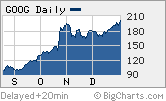
NEW YORK (CNN/Money) -
Two hundred is a pretty darn good score in bowling. But is it a good price for Google?
Google (Research) closed last Monday, the first trading day of the year, at $202.71, the first time the company closed above $200 during its brief history as a publicly traded firm. (The stock has since fallen back below $200.)
Google is among a select list of companies whose stocks cost at least $100 and investing message boards are rife with chatter that the company could split its stock.
After all, Google rival Yahoo! (Research) has split five times since its IPO in 1997. Amazon.com (Research) split its stock three times in the late 1990s. And eBay (Research) has split its stock three times since it went public in 1998.
Google would not comment on the speculation. But analysts say investors shouldn't hold their breath for a stock split announcement.
Google is a different animal than other high profile Net companies. Management doesn't seem to mind if its stock price is out of reach for some average investors. The company originally set a price range of $105 to $135 for its IPO. (It subsequently lowered the offering price to $85.)
"When the company set the first pricing range over $100, it sent the message that pricing the shares in a widows and orphans fashion was not a goal," said Mark Mahaney, an analyst with American Technology Research.
Following Buffett's footsteps
In addition, Google's co-founders quoted Warren Buffett in a folksy Buffett-esque letter in its IPO prospectus, leading many on Wall Street to believe that the company, like Buffett's Berkshire Hathaway, may never split its stock. Berkshire (Research) recently traded for $87,400.
"I don't think they are going to split," said David Garrity, an analyst with Caris & Company. "Management has indicated that while they are a public company, they would like to run themselves as if they were a private company and you could argue that's a similar path as Berkshire."
Of course, a stock split doesn't change anything about the fundamental value of a company. If you owned 100 shares of Google and it split 2-for-1, you'd wind up with 200 shares of Google at half the current price.
Moreover, Google is trading at about 60 times 2005 earnings estimates and a stock split isn't going to make that valuation any cheaper, either.
But companies often split their stock to lure more individual investors.
"Some retail investors who think about buying stocks in lots of 100 shares may look at Google and think that costs $20,000, which is a lot of money," said Mahaney. "So at some level, there could be an issue with shares priced that high."
Keeping out the riffraff?
Then again, investors who have watched Google surge more than 135 percent from its offering price might not be put off. For big institutional investors, the stock price clearly isn't a concern.
 |
|
| A triple-digit stock price hasn't slowed Google's momentum so far. |
"There is no compelling reason for a split since large institutional investors have the capital to buy shares regardless of the price," said Garrity.
And if Google is serious about trying to limit volatility in its stock, a high price could make it more expensive for day traders to jump in and out. It also keeps the available share count lower, which would also make it tougher for more speculative investors to buy the stock.
Finally, even though Google is trading at a relatively high level, there's still a big difference between it and Berkshire. Even the Berkshire B (Research) shares cost nearly $2,900.
"The stock price only becomes a problem when people can't afford to buy one share. Most people can buy 10 shares of Google," said John Tinker, an analyst with ThinkEquity Partners.
Maybe Google would reconsider if the share price starts approaching a perfect bowling score: $300. Even then, the company may steer clear of a split.
Analysts quoted in this story do not own shares of the companies mentioned and their firms have no investment banking ties with the companies.
Sign up to receive the Tech Investor column by e-mail.
Plus, see more tech commentary and get the latest tech news.

|

